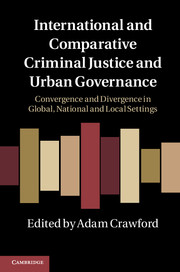 International and Comparative Criminal Justice and Urban Governance
International and Comparative Criminal Justice and Urban Governance from PART 1 - International criminal justice
Published online by Cambridge University Press: 05 June 2011
Introduction
In the last two decades, the United Nations (UN) Security Council has – almost accidentally – created the rudiments of a system of international criminal justice. This chapter explores the Security Council's development of these foundations of a system of international criminal justice and its unintended consequences. In both investigation and fact-finding, and in its sanctions practice, the Council's approach has moved in the last twenty years from one based on interstate and diplomatic tools towards arrangements that more closely resemble criminal justice tools found at the national level. And in each case, this has led to calls for similar procedural norms that govern criminal justice at the national level – such as due process and the need for an impartial decision-maker – to govern the use of these tools at the international level.
The relationship between the Security Council and the development of international criminal justice tools is a surprisingly under-studied question. While there have been numerous examinations in recent years of the Security Council's human rights and rule of law obligations (Clapham 2006; Chesterman 2008, 2009; Flynn 2006; Wood 2006), most of these studies are confined to theoretical examinations of the application of international law to the Council, or its subsidiary organs of the Council (see Goldstone and Smith 2008 and Zappalà 2003 on international criminal tribunals; and see Farrall 2007 on sanctions mechanisms).
To save this book to your Kindle, first ensure [email protected] is added to your Approved Personal Document E-mail List under your Personal Document Settings on the Manage Your Content and Devices page of your Amazon account. Then enter the ‘name’ part of your Kindle email address below. Find out more about saving to your Kindle.
Note you can select to save to either the @free.kindle.com or @kindle.com variations. ‘@free.kindle.com’ emails are free but can only be saved to your device when it is connected to wi-fi. ‘@kindle.com’ emails can be delivered even when you are not connected to wi-fi, but note that service fees apply.
Find out more about the Kindle Personal Document Service.
To save content items to your account, please confirm that you agree to abide by our usage policies. If this is the first time you use this feature, you will be asked to authorise Cambridge Core to connect with your account. Find out more about saving content to Dropbox.
To save content items to your account, please confirm that you agree to abide by our usage policies. If this is the first time you use this feature, you will be asked to authorise Cambridge Core to connect with your account. Find out more about saving content to Google Drive.